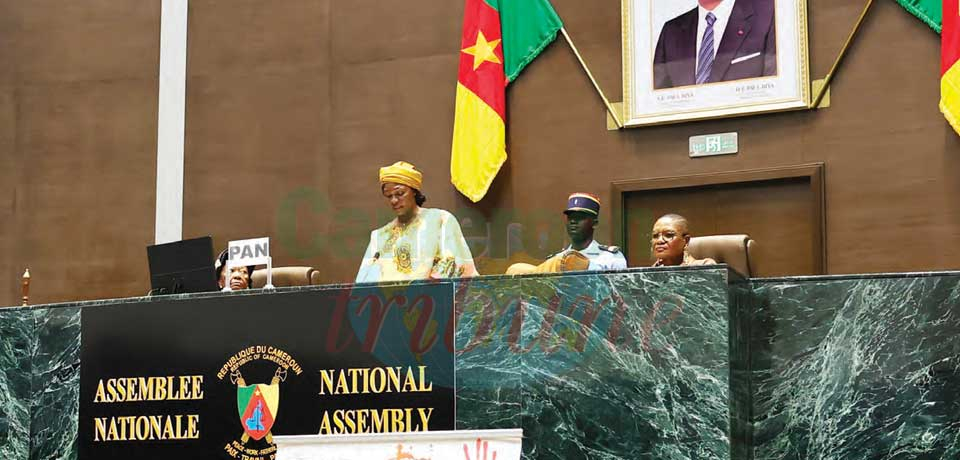Press release following the ninth session of Cameroon Business Forum of 12 March, 2018 in Douala.
«The Prime Minister, Head of Government, His Excellency Philemon Yang, this Monday 12 March 2018 chaired the ninth session of the Cameroon Business Forum (CBF) in Douala from 9:00 a.m. on the theme "Financing small and medium sized enterprises and developing Cameroon 's industrial fabric ".
This meeting was attended by some Members of Government as well as representatives of the private sector, the diplomatic corps and development partners.
The ceremonial phase of this sitting was marked by three speeches, after the welcome address of the Government Delegate to the Douala City Council. '
The President of the Private Sector platform started by praising the establishment of the Cameroon Business Forum since 2009.
He said this exchange platform between public and private sector stakeholders helped to introduce important structural reforms and improve the business climate, despite challenges faced by Cameroonian Small and medium Sized Enterprises (SMEs). He noted the commitment of economic operators to better structure their companies for a more dynamic private sector.
On his heels, the President of the Chamber of Commerce, Industry, Mines and Craft (CCIMA) advocated the implementation of bold reforms which can improve Cameroon's ranking at the international level. He laid emphasis on the promotion of home made products to encourage industrial development and favour the blossoming of SMEs.
In his opening speech, the Head of Government recalled some progress recorded during the year 2017, as part of the improvement of the business climate in Cameroon. In this respect, he mentioned (i) the going operational of the escrow account dedicated to the reimbursement of VAT credits; (ii) the establishment of a system for the transmission of electronic receipts in the Directorate of Large Corporations and the Tax Centres for Medium-sized Enterprises; (iii) the legal framework for the dematerialization of public procurement procedures.
The Prime Minister stressed that the recent guidelines of the Head of State prescribing the priority settlement of the debt owed to SMEs as well as the improvement of their access to bank loans confirm the resolve of public authorities to optimize support to the private sector.
At the end of this ceremonial phase, participants listened to the special statement of the Minister of the Economy, Planning and Regional Development, in which he invited private sector stakeholders to take part in the Commonwealth Business Forum, scheduled for 16~18 April 2018 in London, United Kingdom, to increase investment opportunities available to them.
At the beginning of the Forum itself, the Permanent Secretary of the Cameroon Business Forum presented an activity for the intersession period. Overall, it emerged that out of the 25 recommendations adopted at the end of the 8th session of the CBF, sixteen (16) were implemented, six (06) are currently being implemented, two (02) have not yet been implemented while one recommendation was reclassified.
The efforts made by Government resulted in the 'improvement of Cameroon's ranking in the Doing Business 2018 ranking, from 166th to 163rd place out of 190 countries. The Permanent Secretary of the CBF concluded his report by mentioning some prospects, notably the drafting of a text setting the terms of dematerialization of urban planning instruments, the setting up of a mobile payment system on the platform of the one stop shop of Foreign Trade Operations.
As the session unfolded, the President of Cameroon lndustrialists Union recommended the consolidation of the mechanisms set up by Public authorities in combating the non-compliant products from contraband. This also applies to the Pre-shipment Inspection Scheme of goods imported into the Republic of Cameroon (PECAE), the Stop Illegal Trade Programme (HALCOMI) and checks conducted by the Ministry of Trade. He finally stressed the need to institute the conformity stamping on referenced products.
The Minister of Trade presented the Strategy for protecting and promoting the national economic fabric, stating that it is underpinned by various legal instruments, notably the law of 5 August 1996 on standardization; (ii) that of 19 April 2002 on the Investments Charter in the Republic of Cameroon, as amended and supplemented by Ordinance No. 2009/001 of l3 May 2009; (iii) the law of 18 April 2013 setting incentives for private investment in the Republic of Cameroon as well as (iv) the law of 16 December 2013 governing Economie Zones. He also po...
Cet article complet est réservé aux abonnés
Déjà abonné ? Identifiez-vous >
Accédez en illimité à Cameroon Tribune Digital à partir de 26250 FCFA
Je M'abonne1 minute suffit pour vous abonner à Cameroon Tribune Digital !
- Votre numéro spécial cameroon-tribune en version numérique
- Des encarts
- Des appels d'offres exclusives
- D'avant-première (accès 24h avant la publication)
- Des éditions consultables sur tous supports (smartphone, tablettes, PC)














Commentaires